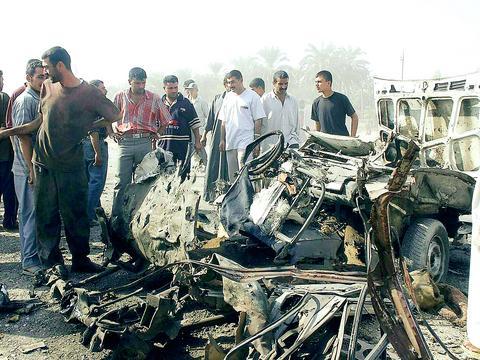An estimated 100,000 civilians have died in Iraq as a direct or indirect consequence of last year's US-led invasion, according to a new study by a research team at the Bloom-berg School of Public Health at Johns Hopkins University in Baltimore.
Coming just a few days before the presidential election the finding is certain to generate intense controversy, since it is far higher than previous mortality estimates for the Iraq conflict.

PHOTO: EPA
Editors of The Lancet, the London-based medical publication, where an article describing the study is scheduled to appear, decided not to wait for the normal publication date next week, but to place the research online yesterday, apparently so it could circulate before the election.
The Bush administration has not estimated civilian casualties from the conflict, and independent groups have put the number at most in the tens of thousands.
In the study, teams of researchers led by Dr. Les Roberts fanned out across Iraq in the middle of last month to interview nearly 1,000 families in 33 locations. Families were interviewed about births and deaths in the household before and after the invasion.
Although the authors acknowledge that thorough data collection was difficult in what is effectively still a war zone, the data they managed to collect is extensive. Using what they described as the best sampling methods that could be applied under the circumstances, they found that Iraqis were 2.5 times more likely to die in the 17 months following the invasion than in the 14 months before it.
Before the invasion, the most common causes of death in Iraq were heart attacks, strokes, and chronic diseases. Afterward, violent death was far ahead of all other causes.
"We were shocked at the magnitude but we're quite sure that the estimate of 100,000 is a conservative estimate," said Dr. Gilbert Burnham of the Johns Hopkins team.
Burnham said the team excluded data about deaths in Fallujah in making their estimate, because that city was the site of unusually intense violence.
In 15 of the 33 communities visited, residents reported violent deaths in their families since the conflict started.
They attributed many of those deaths to attacks by US-led forces, mostly airstrikes, and most of those killed were women and children. The risk of violent death was 58 times higher than before the war, the researchers reported.
The team included researchers from the Johns Hopkins Center for International Emergency, Disaster and Refugee Studies, which has conducted similar mortality studies about North Korea and Congo.
It also included doctors from Al Mustansiriya University Medical School in Baghdad.
There is bound to be skepticism about the estimate of 100,000 excess deaths, since that translates into an average of 166 deaths a day since the invasion.
But some people were not surprised.
"I am emotionally shocked but I have no trouble in believing that this many people have been killed," said Scott Lipscomb, an associate professor at Northwestern University, who works on the www.iraqbodycount.net project.
That project, which collates only deaths reported in the news media, currently put the maximum civilian death toll at just under 17,000.
"We've always maintained that the actual count must be much higher," Lipscomb said.

PRECARIOUS RELATIONS: Commentators in Saudi Arabia accuse the UAE of growing too bold, backing forces at odds with Saudi interests in various conflicts A Saudi Arabian media campaign targeting the United Arab Emirates (UAE) has deepened the Gulf’s worst row in years, stoking fears of a damaging fall-out in the financial heart of the Middle East. Fiery accusations of rights abuses and betrayal have circulated for weeks in state-run and social media after a brief conflict in Yemen, where Saudi airstrikes quelled an offensive by UAE-backed separatists. The United Arab Emirates is “investing in chaos and supporting secessionists” from Libya to Yemen and the Horn of Africa, Saudi Arabia’s al-Ekhbariya TV charged in a report this week. Such invective has been unheard of

US President Donald Trump on Saturday warned Canada that if it concludes a trade deal with China, he would impose a 100 percent tariff on all goods coming over the border. Relations between the US and its northern neighbor have been rocky since Trump returned to the White House a year ago, with spats over trade and Canadian Prime Minister Mark Carney decrying a “rupture” in the US-led global order. During a visit to Beijing earlier this month, Carney hailed a “new strategic partnership” with China that resulted in a “preliminary, but landmark trade agreement” to reduce tariffs — but

Chinese President Xi Jinping’s (習近平) purge of his most senior general is driven by his effort to both secure “total control” of his military and root out corruption, US Ambassador to China David Perdue said told Bloomberg Television yesterday. The probe into Zhang Youxia (張又俠), Xi’s second-in-command, announced over the weekend, is a “major development,” Perdue said, citing the family connections the vice chair of China’s apex military commission has with Xi. Chinese authorities said Zhang was being investigated for suspected serious discipline and law violations, without disclosing further details. “I take him at his word that there’s a corruption effort under

China executed 11 people linked to Myanmar criminal gangs, including “key members” of telecom scam operations, state media reported yesterday, as Beijing toughens its response to the sprawling, transnational industry. Fraud compounds where scammers lure Internet users into fake romantic relationships and cryptocurrency investments have flourished across Southeast Asia, including in Myanmar. Initially largely targeting Chinese speakers, the criminal groups behind the compounds have expanded operations into multiple languages to steal from victims around the world. Those conducting the scams are sometimes willing con artists, and other times trafficked foreign nationals forced to work. In the past few years, Beijing has stepped up cooperation